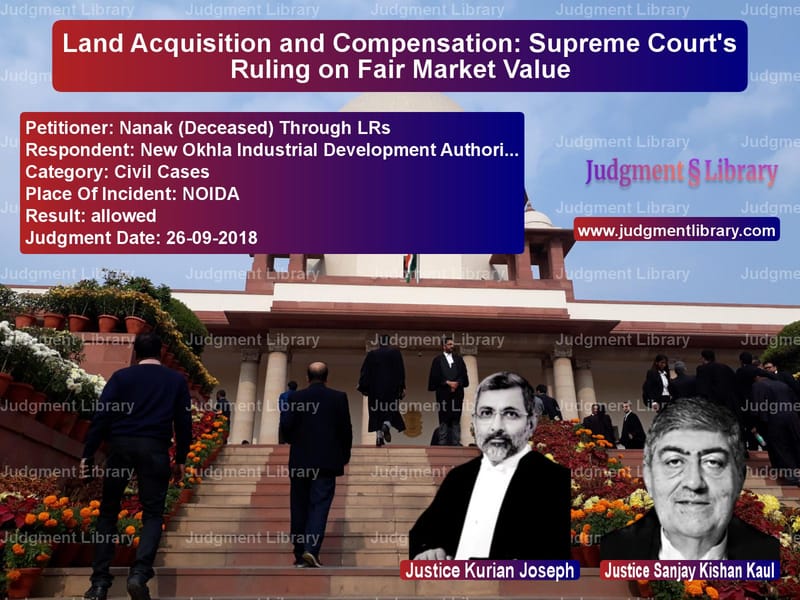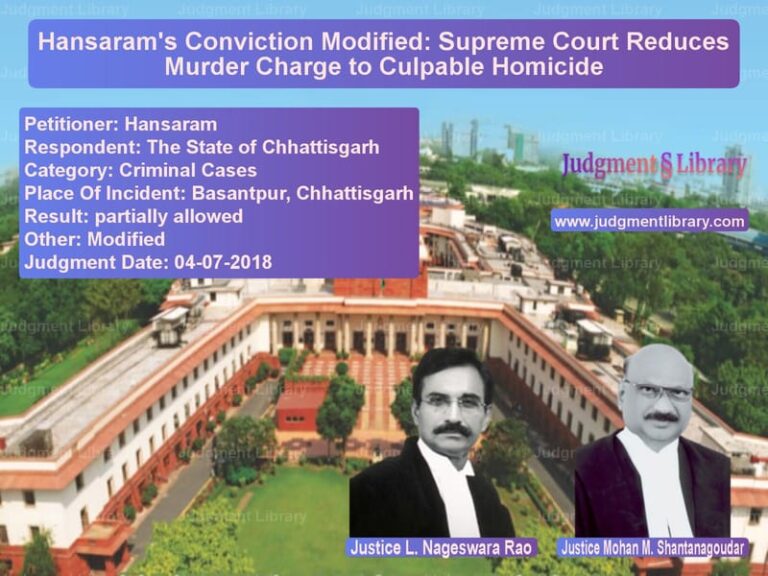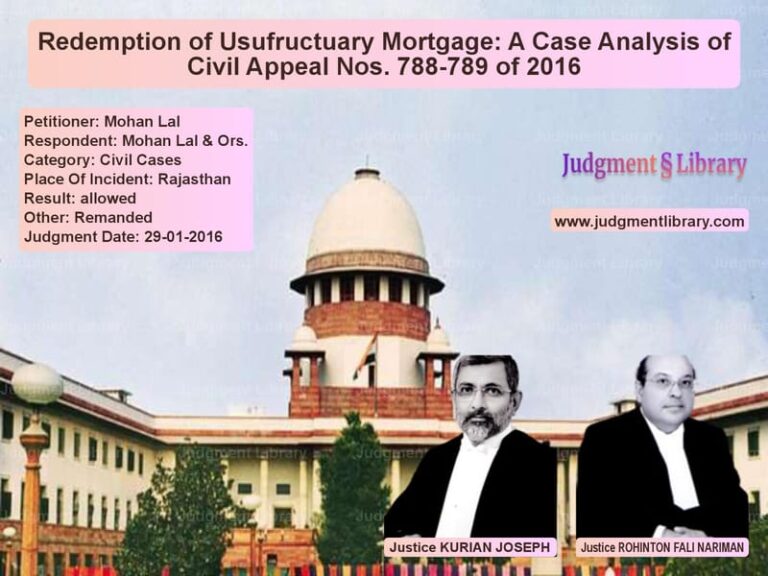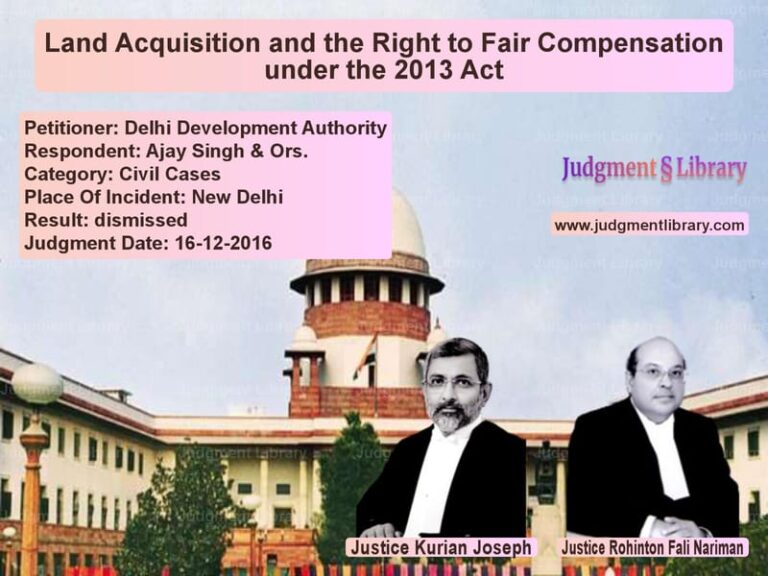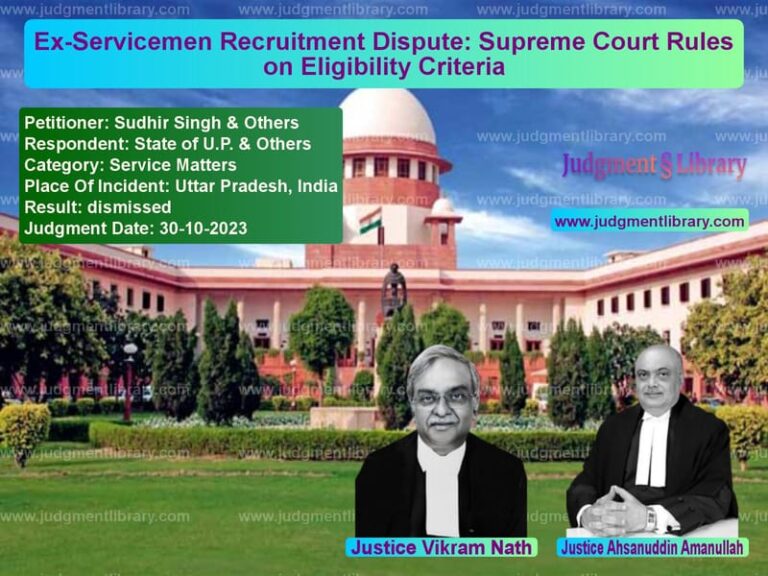Land Acquisition and Compensation: Supreme Court’s Ruling on Fair Market Value
The case of Nanak (Deceased) Through LRs vs. New Okhla Industrial Development Authority & Anr. is a landmark ruling concerning land acquisition compensation, the principle of equitable treatment for landowners, and the fair market value of acquired land. The appellants, whose land was taken over for industrial development by the New Okhla Industrial Development Authority (NOIDA), contended that their compensation was lower than what had been awarded to similarly situated landowners.
The Supreme Court examined whether the appellants were entitled to the same compensation as previously determined for other landowners in the same village under the same acquisition notification. The ruling reaffirmed the principle that similarly placed individuals must receive equal treatment under the law.
Background of the Case
The appellants owned land that was compulsorily acquired by NOIDA for an industrial expansion project. However, they later discovered that other landowners in the same region, whose land was covered by the same acquisition notification, had been awarded higher compensation by the Supreme Court in previous cases.
Feeling aggrieved by the disparity, they filed petitions seeking an enhancement of their compensation to match the previously awarded rates of Rs. 297 per square yard.
Legal Issues Before the Court
- Should the appellants be entitled to the same compensation as other landowners covered under the same acquisition notification?
- How should the fair market value of the acquired land be determined?
- Does differential treatment in awarding compensation violate the principles of equality and justice?
- What legal precedents govern the determination of land acquisition compensation?
Petitioners’ Arguments
The appellants contended that:
- The Supreme Court had already set a precedent by awarding Rs. 297 per square yard as compensation for landowners in the same village.
- They were being unfairly deprived of fair compensation, creating an unjust disparity among landowners whose land was acquired under identical circumstances.
- Equal treatment of landowners is a fundamental principle of justice, and failing to award them the same compensation would amount to discrimination.
Respondents’ Arguments
On the other hand, NOIDA and the government authorities argued that:
- The compensation already awarded was determined based on the market value applicable at the time of acquisition.
- Each case should be assessed independently, and prior compensation rulings should not automatically apply without fresh consideration of facts.
- An increase in compensation should be justified by substantial evidence proving that the previous amount was inadequate.
Supreme Court’s Observations
The Supreme Court, comprising Kurian Joseph and Sanjay Kishan Kaul, made the following key observations:
1. Principle of Parity in Compensation: “It is not in dispute that this Court has granted compensation at the rate of Rs. 297 per square yard in respect of the land situated in the same village and covered by the same notification. The principle of parity demands that similarly placed landowners receive equal compensation.”
2. Fair Market Value Consideration: “Since the landowners are similarly placed and the purpose of acquisition remains identical, it is only just and reasonable that the appellants are also granted the same compensation as previously determined.”
3. Equal Treatment of Landowners: “Denying the appellants the same compensation would result in an arbitrary distinction that cannot be justified under principles of equity and justice.”
4. Consistency in Compensation Awards: “Government authorities must ensure that compensation determinations are uniform and do not create unjustified discrepancies between landowners.”
Final Judgment and Directions
The Supreme Court ruled in favor of the appellants and issued the following directions:
- The respondents (NOIDA) must compensate the appellants at the rate of Rs. 297 per square yard.
- The compensation must include all statutory benefits as provided under land acquisition laws.
- The payment must be deposited within three months of the order.
Impact of the Judgment
This ruling has far-reaching implications for land acquisition policies and compensation standards:
- It reinforces the principle that similarly placed landowners must receive equal compensation to prevent discrimination.
- It upholds fairness and transparency in the process of determining compensation.
- It establishes a precedent for challenging inadequate compensation awards.
- It ensures that land acquisition for industrial development does not lead to arbitrary disparities among affected landowners.
Conclusion
The Supreme Court’s decision in this case upholds the fundamental principle of equitable compensation in land acquisition matters. The ruling ensures that government agencies follow a uniform approach in awarding compensation and prevents arbitrary discrimination among landowners.
Petitioner Name: Nanak (Deceased) Through LRs.Respondent Name: New Okhla Industrial Development Authority & Anr..Judgment By: Justice Kurian Joseph, Justice Sanjay Kishan Kaul.Place Of Incident: NOIDA.Judgment Date: 26-09-2018.
Don’t miss out on the full details! Download the complete judgment in PDF format below and gain valuable insights instantly!
Download Judgment: Nanak (Deceased) Thr vs New Okhla Industrial Supreme Court of India Judgment Dated 26-09-2018.pdf
Direct Downlaod Judgment: Direct downlaod this Judgment
See all petitions in Damages and Compensation
See all petitions in Property Disputes
See all petitions in Landlord-Tenant Disputes
See all petitions in Judgment by Kurian Joseph
See all petitions in Judgment by Sanjay Kishan Kaul
See all petitions in allowed
See all petitions in supreme court of India judgments September 2018
See all petitions in 2018 judgments
See all posts in Civil Cases Category
See all allowed petitions in Civil Cases Category
See all Dismissed petitions in Civil Cases Category
See all partially allowed petitions in Civil Cases Category

